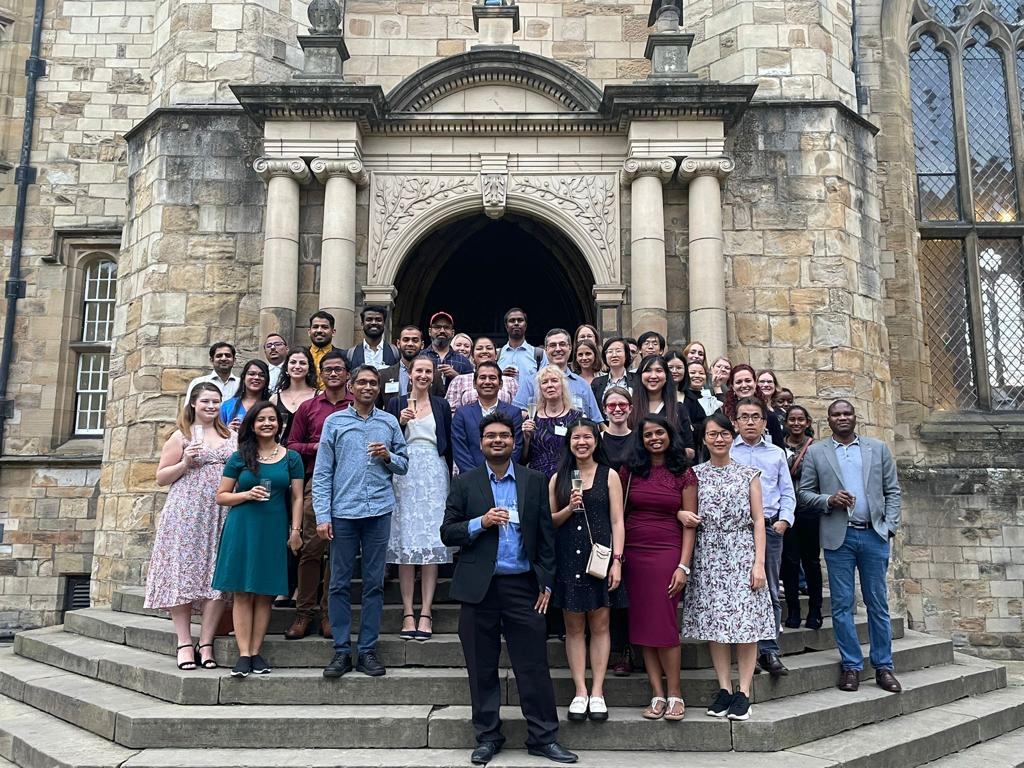Plant Systems and Biodiversity
Research within our community is bringing together expertise from across disciplines to study fundamental plant systems across measurement scales and to solve the challenges of food security and monitoring biodiversity.
Research Highlights
-
Professor Keith Lindsay (Durham Biosciences) and an international team of collaborators have shed new light on the mechanism of cell differentiation from Arabidopsis meristemic (undifferentiated) cells, and how external stressors such as low temperatures effect its regulation. Find out more here.
-
Plant ubiquitin has been identified by Professor Martin Cann’s group (Durham Biosciences) as a target for CO2 binding. This offers new insights into how plant cells can respond to fluctuating levels of atmospheric CO2 and its role in regulation. Find out more here.
-
Professor Heather Knight (Durham Biosciences) and a team of interdisciplinary researchers have found a link between increased water-loss in leaves and the presence of the sugar fucose in their cell walls. Using biophysical techniques, the team found that the cell wall of the non-fucosylated Arabidopsis sfr8 mutant, had different mechanical properties. Find out more here.
Plant Growth Promotion - a Novel Small Molecule with GA-DELLA Function
The Role of SUMO in Light Signalling Pathways
Case Study: Supporting Early Career Researchers
Forging New Collaborations
A cross-disciplinary early career network event was held in September 2022. The UKRRC (UK Rice Research Consortium) Early Career Rice Researcher Meeting was held in Durham and sponsored by the BSI. The event attracted 48 attendees from 14 universities and organisations from across the UK.
For more information about the UKRRC please visit the website using the links below.
Highlight Publications
Gannon, H.G., & Cann, M.J., 2023. Near atmospheric carbon dioxide activates plant ubiquitin cross-linking. BBA Advances, 4.
Gough, C., & Sadanandom, A., 2021. Understanding and exploiting post-translational modifications for plant disease resistance. Biomolecules, 11, 8.
Guillén-García, A., Gibson, S.E.R., Jordan, C.J.C., Ramaswamy, V.K., Linthwaite, V.L., Bromley, E.H.C., Brown, A.P., Hodgson, D.R.W., Blower, T.R., Verlet, J.R.R., Degiacomi, M.T., Pålsson, L.-O., & Cann, M.J., 2022. Allophycocyanin A is a carbon dioxide receptor in the cyanobacterial phycobilisome. Nature Communications, 13, 1.
Jacobsen, A.G.R., Jervis, G., Xu, J., Topping, J.F., & Lindsey, K., 2021. Root growth responses to mechanical impedance are regulated by a network of ROS, ethylene and auxin signalling in Arabidopsis. New Phytologist, 231, 1.
Panter, P.E., Seifert J., Dale, M., Pridgeon, A.J., Hulme, R., Ramsay, N., Contera, S., & Knight, H., 2023. Cell wall fucosylation in Arabidopsis influences control of leaf water loss and alters stomatal development and mechanical properties. Journal of Experimental Botany, 74, 8.
Pollastri, S., Sukiran, N.A., Jacobs, B.C.I.C., & Knight, M.R., 2021. Chloroplast calcium signalling regulates thermomemory. Journal of Plant Physiology, 264.
Schwarz, M., Eno, R.F.M., Freitag-Pohl, S., Coxon, C.R., Straker, H.E., Wortley, D.J., Hughes, D.J., Mitchell, G., Moore, J., Cummins, I., Onkokesung, N., Brazier-Hicks, M., Edwards, R., Pohl, E., & Steel, P.G., 2021. Flavonoid-based inhibitors of the Phi-class glutathione transferase from black-grass to combat multiple herbicide resistance. Organic and Biomolecular Chemistry, 19, 42.
Srivastava, M., Srivastava, A.K., Roy, D., Mansi, M., Gough, C., Bhagat, P.K., Zhang, C., & Sadanandom, A., 2022. The conjugation of SUMO to the transcription factor MYC2 functions in blue light-mediated seedling development in Arabidopsis. Plant Cell, 34, 8.
Sukiran, N.A., Pollastri, S., Steel, P.G., & Knight M.R., 2022. Plant growth promotion by the interaction of a novel synthetic small molecule with GA-DELLA function. Plant Direct, 6, 4.
Thompson, H.L., Shen, W., Matus, R., Kakkar, M., Jones, C., Dolan, D., Grellscheid, S., Yang, X., Zhang, N., Mozaffari-Jovin, S., Chen, C., Zhang, X., Topping, J.F., & Lindsey, K., 2023. MERISTEM-DEFECTIVE/DEFECTIVELY ORGANIZED TRIBUTARIES2 regulates the balance between stemness and differentiation in the root meristem through RNA splicing control. Development (Cambridge), 150, 7.
.png)
Plant Systems and Biodiversity Academics
Dr Ulrike Bechtold, Department of Biosciences
Areas of Expertise: Plant Cell Biology
Research Interests
- Plant stress responses
- Signalling pathways
- Transcriptional and post-transcriptional regulation
- Post-translational modifications
- Comparative genomics
- Evolution of genomes and quantitative trait architecture
Professor Martin Cann, Department of Biosciences
Areas of Expertise: Biochemistry
Research Interests
- Carbon dioxide sensing
- Bacterial death
Professor Heather Knight, Department of Biosciences
Areas of Expertise: Molecular Plant Cell Biology
Research Interests
- The roles of genes in the model plant Arabidopsis thaliana that determine the plant’s level of tolerance to freezing stress
- Physical and mechanical properties of plants that determine freezing resistance
Professor Marc Knight, Department of Biosciences
Areas of Expertise: Plant Molecular Cell Biology, Plant Signalling
Research Interests: How stress information is encoded in calcium responses and how this is decoded by plants to produce the appropriate survival response.
Professor Keith Lindsey, Department of Biosciences
Areas of Expertise: Plant Molecular Cell Biology, Plant Signalling
Research Interests: Identification of plant intracellular signalling molecules - roots and development
Dr Junli Liu, Department of Biosciences
Areas of Expertise: Systems biology
Research Interests: Hormone and Calcium Signalling in Plants.
Professor Ari Sadanandom, Department of Biosciences
Areas of Expertise: Molecular Plant Sciences
Research Interests: Polypeptide tags: Protein Modification systems such as Small Ubiquitin-like MOdifiers (SUMO) and their roles in plants' resilience under a changing climate.
Dr Rebecca Senior, Department of Biosciences
Areas of Expertise: Conservation, Ecology, Quantitative Tools & Technology
Research Interests: The use of quantitative tools and technology to understand the drivers of biodiversity loss.


/prod01/prodbucket01/media/durham-university/research-/research-institutes/biophysical-sciences-institute/biophysical-stock-images/83458.jpg)

/prod01/prodbucket01/media/durham-university/campaign-sites/Close-Up.jpg)
/prod01/prodbucket01/media/durham-university/departments-/biosciences/infrastructure-/Crop-greenhouse.jpg)
